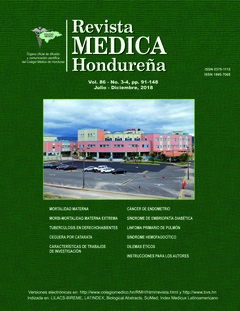Cataract blindness, a national overlooked challenge: About an experience
DOI:
https://doi.org/10.5377/rmh.v86i3-4.12173Keywords:
Cataract, Cataract extraction, Eye health, Visually impaired personsAbstract
Background: Inasmuch as cataract is the main cause of blindness and visual impairment, international organisms and governments have adopted policies and plans that give priority to it, as the World Health Organization (WHO), and the International Association for Prevention of Blindness (IAPB) initiative VISION 20/20, universally embraced by all the member states, in which cataract surgery is prioritized for preventable blindness reduction, particularly in underdeveloped countries. Objective: To describe the experience of Centro de Salud Integral Zoé, Tegucigalpa, in the implementation of a cataract blindness prevention program, period 2010 – 2017. Methodology: CSI-Zoé is a non-lucrative NGO with general and specialized visual health services. Provides free of charge or highly subsidized social services, affordable to the general public. Data about visual impairment care were gathered and analyzed for the 2010 -2017 period, focusing on cataract diagnosis and management. Results: Only for 2017, 174 eye camps for gathering patients with ocular problems were conducted along the more deprived areas of the country; 16,426 people with visual impairments, particularly patients over 50 years were served; 1,357 needed a cataract surgery and were referred to the Tegucigalpa Center for their management. For the 2010 – 2017 period, 12,352 cataract surgeries with a year average of 1,500 were performed (range 746 to 2,254). Discussion: CSI-Zoé has implemented a successful program for cataract surgery as the best strategy to prevent blindness, being at the front around the country as the center with the most promptness in the national response for prevention of cataract blindness.
Downloads
405




